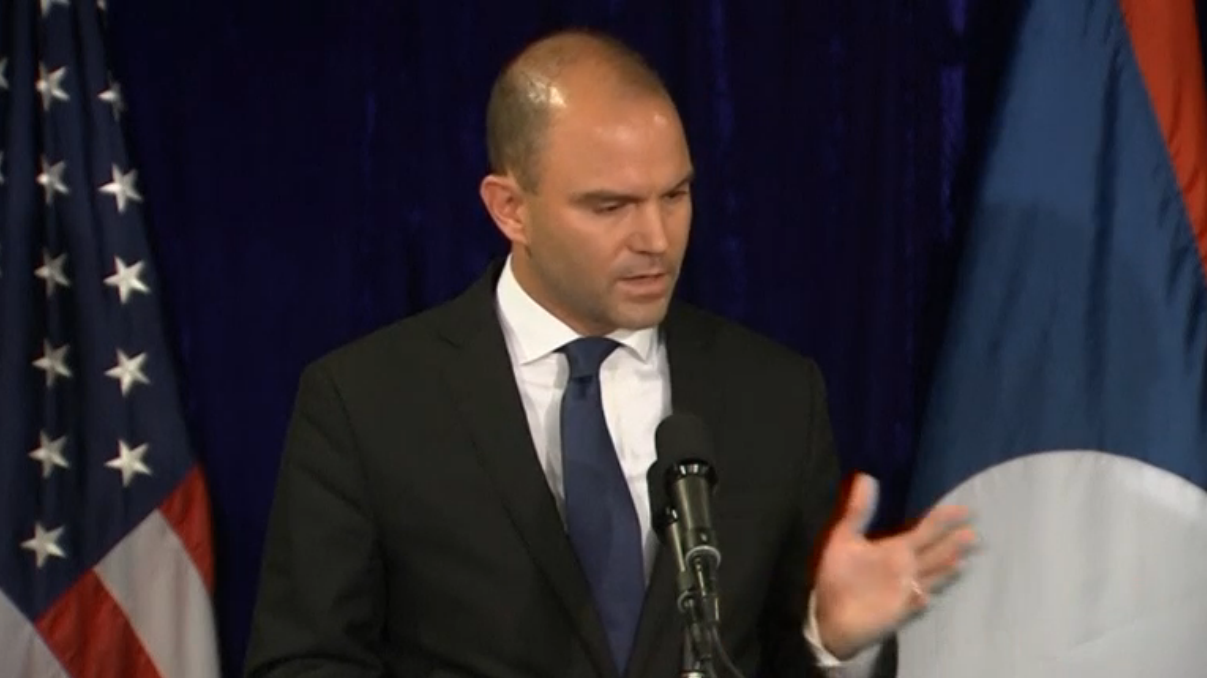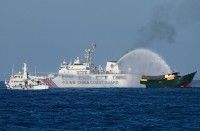
(Eagle News) — The United States said the relationship between the US and the Philippines remained “rock solid” as a US official stressed that a “very close working relationship” between the two countries will continue.
This was despite the cancellation of a bilateral meeting between US President Barack Obama and Philippine President Rodrigo Duterte during the ASEAN Summit in Laos on Tuesday (September 6)
Obama’s deputy National Security director Ben Rhodes told reporters the U.S-Philippine relationship remained “rock solid.” Rhodes and that “people should certainly expect that our very close working relationship with the Philippines is going to be enduring.”
“The nature of our alliance with the Philippines has been and remains rock solid. We have incredibly close working relationships with the government of the Philippines on issues related to disaster response, maritime security, diplomatic coordination on issues related to the South China Sea, economic, commercial and people to people ties, so people should certainly expect that our very close working relationship with the Philippines is going to be enduring,” he said.
But Ben Rhodes said the focus on Duterte’s comments leading into the summit had not created a constructive environment for a bilateral meeting.
“All of the attention frankly was on those comments, and therefore not on the very substantive agenda that we have with the Philippines,” he told reporters.
“With respect to the bilateral meeting, I think it was our judgement that given the focus on the tension of President Duterte’s comments leading into the meetings here, we felt that did not create a constructive environment for a bilateral meeting all of the attention frankly was on those comments and not on the very substantive agenda we have with the Philippines, so again, given that focus, we felt it wasn’t the right time to have a bilateral meeting between the two presidents and that’s something we discussed with officials from the government of the Philippines last night. Again, going forward, I would expect our close cooperation to continue and where we also have differences, we’ll continue to speak to those,” Rhodes explained.
Officials from both countries said there would be no formal meeting rescheduled in Laos but a short conversation between the two presidents was possible.
Duterte’s officials said the cancellation was a “mutual” decision even as the Philippine president voiced regret for his remarks that let to the cancellation of the Obama-Duterte meeting.
The controversial “son of a bitch” expletive in Filipino by Duterte was not directed at Obama, the President’s statement said.
“President Duterte explained that the press reports that President Obama would ‘lecture’ him on extrajudicial killings led to his strong comments, which in turn elicited concern,” the Philippines said in a statement released at a summit in Laos.
“He regrets that his remarks to the press have caused much controversy,” it said.
The Philippine president is known for his frequent cursing during emotional speeches – a habit which has now gained world media attention.
A statement from the Presidential Communications said “President Rodrigo Duterte’s statements at a press conference during his departure speech on Monday has been totally blown out of proportion by the local and international media.”
It even cited ‘Liberal America’ writer Nizza Gueco, who wrote a column on the “Liberal America” website, dissecting the transcript of the question and answer portion of Duterte’s pre-departure presscon in Davao City.
“Lo and behold, my suspicions were true, the line that was cut from the video above wherein the President said “—” was not even directed to President Obama, it was directed to the reporter who, according to the President, ‘just threw questions and statements,'” Gueco was quoted as saying by the Presidential Communications statement.
The tiff between the two allies overshadowed the opening of a summit of East and Southeast Asian nations in Vientiane, Laos.
It also soured Obama’s last swing as president through a region he has tried to make a focus of U.S. foreign policy, a strategy widely seen as a response to China’s economic and military muscle-flexing.
Instead of the Duterte meeting, Obama held talks with South Korean President Park Geun-hye, a day after North Korea fired three medium-range missiles into the sea. He urged a full implementation of sanctions against North Korea, adding that the missile test demonstrated the threat that Pyongyang posed.
Obama is also likely to hold an unscheduled meeting in Laos with Japanese Prime Minister Shinzo Abe to discuss North Korea, Rhodes said. He said Washington needed to maintain a sense of urgency within the international community on sanctions against Pyongyang.
Diplomats say strains with longtime ally the Philippines could compound Washington’s difficulties in forging a united front with Southeast Asian partners on the geostrategic jostle with Beijing over the South China Sea.
Rhodes also discussed the need to focus on North Korean sanctions following news of another missile test.
“We have to be very vigilant in sanctions enforcement and we have to maintain the sense of urgency among the international community,” Rhodes said.
Obama, the first sitting U.S. president to visit Laos, said on Tuesday he wanted to address the legacy of U.S. bombing during the Vietnam War. He announced that Washington would provide an additional $90 million over three years to help clear unexploded ordnance, which has killed or wounded over 20,000 people.
But the unusually open tensions between the United States and the Philippines, its former colony, threaten to overshadow the Association of Southeast Asian Nations (ASEAN) and East Asia Summits in Laos, which run until Thursday.
The Philippines will be chairing the ASEAN Summit next year, 2017, when the ASEAN is celebrating its 50th year. (With a report from Reuters)





